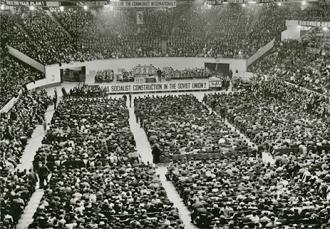So my Wikipedia-level understanding is that Trotsky's chief deviation from the Soviet party line was on the question of how to best transition from Russia's agrarian economy to a socialist system. So with that, what makes Trotskyist parties distinct in modern, fully developed capitalist societies?
Trotsky's chief disagreement was that things weren't run Lev Trotsky's way.
By the way, there were many disagreements about how to handle economic development. Bukharin favored extending NEP instead of the Five Year Plan, for example. Trotsky's primary disagreement was with how economic planning was conducted: he felt that more autonomy should be given to firms instead of being centrally planned, although he agreed with the basic idea of a planned economy. He still supported the Five Year Plan, just not the specific way it was conducted. And of course forced collectivization was
his idea. He favored something even more aggressive than what happened: in reality, collectivization began as an activist campaign conducted on a voluntary basis, but Trotsky favored forced collectivization from the beginning and utter ruthlessness in dealing with the reactionary elements of the peasantry.
After he was exiled from the USSR, Trotsky began referring to it as a Deformed Workers' State. However, he never denied that it was socialist. It was his followers who took up the mantle and developed all manner of theories about Bureaucratic Collectivism and State Capitalism and the bureaucratic class and so on. There's nothing that unites Trotskyists of any type apart from a hatred of the USSR and Stalin specifically, which is why their organizations have so many splits. And to be honest, Trotskyist parties in the West (there are none anywhere else lmfao) have the same basis as Eurocommunists (ultra-left opposition to the USSR and Marxism-Leninism) and their politics flow from the distortions that such a mindset creates. This is why Trots are all over the place; some, like the Spartacist League, give critical support to ISIS. Others like the Cliffites made the mistake of supporting the Ukrainian coup. And then there are the Marcyites, who stuck with orthodox Trotskyism and so adamantly defended Actually Existing Socialism from imperialist encirclement that today the two Marcyite parties, the Worker's World Pary and the Party of Socialism and Liberation, have returned to Marxism-Leninism!



 ).
). Democratic Socialism.
Democratic Socialism.